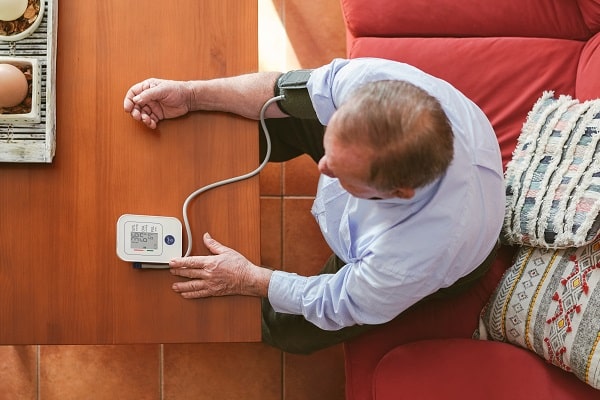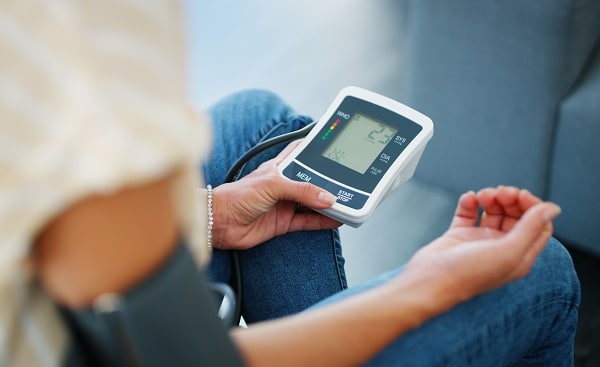Blood pressure can be a tricky thing to manage. What is considered normal for one person may not be normal for another. That’s why it’s important to know what your blood pressure should be for your age group. In this article, you will learn about the ranges typically considered normal for different age groups, as well as some factors that can affect your blood pressure. Keep in mind that you may have slightly different numbers depending on your overall health, so it’s always a good idea to speak to your doctor if you have any concerns.
Contents
Understanding Your Blood Pressure Reading

Blood pressure readings can be tricky to understand, but knowledge is power when it comes to managing your health. Your blood pressure consists of two numbers, with the upper number measuring your systolic pressure and the lower number recording your diastolic pressure. The optimal reading for an adult should be around 120 over 80 mmHg. While fluctuating blood pressure is relatively normal, any unexpected spikes or changes should be discussed with a doctor in order to monitor it.
You should also remember that when reading your blood pressure, it’s important to take multiple readings and average them out. This will give you a better understanding of your overall pressure and more accurate results than just one reading.
Age-Related Blood Pressure Standards
The American Heart Association has established the following sets of standards for what is considered normal blood pressure based on age group:
Children (1-17): Normal blood pressure should be around the 90th percentile or lower for their age, sex, and height.
Adults (18-39): Normal blood pressure should range between 119.5 to 120.5 over 75.5 to 80.5 mmHg.
Middle Age Adults (40-59): Normal blood pressure should range between 115.5 to 129.5 over 78.5 to 80.5 mmHg.
Older Adults (60 and up): Normal blood pressure should range between 129.5 to 143.5 over 76.5 to 79.5 mmHg.
The Stages Of Blood Pressure

For those concerned that their blood pressure is not within the normal range, it’s essential to understand the stages used to classify different blood pressure levels.
Prehypertension: Prehypertension occurs when your systolic number is between 120 and 139 mmHg or if your diastolic number is between 80 and 89 mmHg. During this stage, your doctor may suggest lifestyle and diet changes to lower your blood pressure.
Stage 1 Hypertension: Stage 1 hypertension occurs when your systolic number is between 140 and 159 mmHg or if your diastolic number is between 90 and 99 mmHg. This stage may require lifestyle modifications, such as reducing salt intake or making dietary changes. In some cases, medication may be prescribed to help manage the condition and prevent further complications.
Stage 2 Hypertension: Stage 2 hypertension occurs when your systolic number is 160 mmHg, or higher OR your diastolic number is 100 mmHg or higher. This stage of hypertension may require lifestyle changes and medication to help manage the condition. In addition, some people may need to take multiple medications in order to keep their blood pressure under control.
Hypertensive Crisis: Hypertensive crisis is a medical emergency and occurs when your systolic number is 180 mmHg or higher OR if your diastolic number is 110 mmHg or higher. This stage of hypertension requires immediate medical attention, as it can cause severe damage to vital organs in the body. Left untreated, a hypertensive crisis can lead to stroke, heart attack, organ failure, and even death.
Factors that Can Affect Blood Pressure
While age is a significant factor affecting your blood pressure, there are other factors that can play a role as well. Each of these can play a vital role in your blood pressure levels, and you should monitor them over time.
Diet

Diet is a critical factor in controlling blood pressure. It is well known that certain food choices can directly contribute to decreasing or increasing one’s blood pressure. For example, individuals should try to include more fruits and vegetables in their diet as these types of food contain potassium which can help reduce sodium levels, both of which regulate blood pressure.
Furthermore, it is best to avoid processed food, unhealthy fats, and added sugars, as these types of food can all contribute to high blood pressure, in part due to their high sodium content.
Exercise

The amount of exercise you get can also play a key role in maintaining healthy blood pressure. When someone works out regularly, their heart muscles become stronger and more reliable at delivering oxygen-rich blood without needing as much force. As a result, their blood pressure is typically lower than it would be with less physical activity.
Studies have repeatedly shown that even moderate exercise performed regularly can lower systolic and diastolic numbers considerably over time. Just keep in mind that if you are starting a new exercise routine, it is best to discuss your plan with your doctor and monitor your blood pressure after each session.
Stress

Stress is another common factor that can cause an increase in one’s blood pressure. When under stress, the body releases hormones that can cause your heart rate to increase, which then causes more significant pressure of the blood within the vessels. In addition to this, stress can also lead to an unhealthy diet as people turn to comfort foods and may not get enough exercise. All of these actions can put more strain on your cardiovascular system and make it harder for your heart to function normally, thus increasing your blood pressure.
It is crucial for everyone to have healthy stress management techniques to reduce or prevent high blood pressure from occurring. Relaxation methods such as yoga are great ways to alleviate stress and keep your blood pressure levels under control.
Sleep

Getting enough sleep is vital to many different aspects of your overall health, including your blood pressure. Studies have shown that when a person is consistently sleeping 6-7 hours or less, they may experience a rise in their systolic blood pressure levels. In addition, a lack of sleep can lead to an increase in stress hormones which can, in turn, interfere with the body’s ability to regulate its blood pressure levels effectively.
To ensure healthy blood pressure, you must ensure that you get 7-9 hours of sleep per night and take time for moments of rest during the day. While factors like diet and exercise are also important for regulating your blood pressure levels, prioritizing sleep is just as vital for maintaining overall wellness for your mind, body, and soul.
Understanding Your Blood Pressure Is Vital!
High blood pressure can be a serious and potentially fatal condition if not managed properly. Knowing what causes it and understanding how to keep your levels in check are vital to avoiding the risks associated with hypertension. Be sure to pay attention to each of these factors, as well as what the average is for your age so that you can keep your blood pressure levels within a healthy range. If you experience any signs of high blood pressure, it is crucial to speak with your doctor right away in order to get proper treatment. Taking these steps will help you stay healthy and protect yourself against the potential complications of hypertension.


